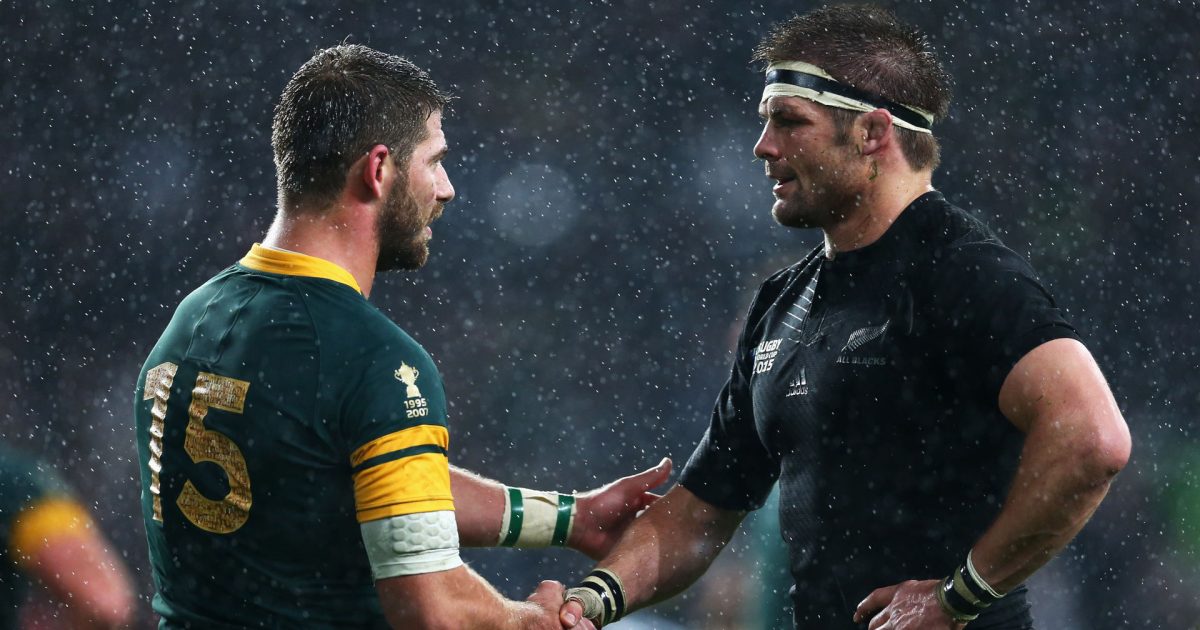The 'one difference' between Boks and the back-to-back All Blacks

Former England captain Dylan Hartley has highlighted what he sees as the ‘one difference’ between South Africa’s back-to-back Rugby World Cup triumphs and the 2011 to 2015 All Blacks.
The Springboks face a crestfallen England team tomorrow in Twickenham and are favourites to come away with the win after England lost to New Zealand and then Australia, with both matches coming down to the buzzer.
Hartley, who captained England to a Grand Slam under Eddie Jones, dismissed any leadership concerns within the squad and explained that the current team were simply missing a collective focus, intensity and understanding in key moments, which has cost them in matches against New Zealand and Australia.
On the challenge of the world champions, Hartley explained that England will be confident that they can get a result though he admitted that they’ll be hurting after the two defeats.
The 38-year-old reckons the current Boks squad is quite the same calibre as the All Blacks team that won the 2011 and 2015 Rugby World Cups.
Hartley noted the All Blacks, led by legends like Richie McCaw and Dan Carter, were near-unbeatable between World Cups, while South Africa focuses on peaking during the tournament itself.
“The current South African team, back-to-back World Cup winners, much like the All Blacks. There’s one difference between this South Africa team and the All Blacks back-to-back World Cup winners.
“The All Blacks seem to be far more dominant; I don’t know if the stats prove that, but it felt that they were unplayable in many instances in that period of back-to-backs World Cup wins. Conrad Smith, Dan Carter, Richie McCaw, that gang of guys, it seemed in between the World Cups they were so dominant, whereas I feel South Africa, and this might just be my perception, they dominated the World Cup, they turn up, they do the business, but in between they’re probably not as convincing as the All Blacks. That’s just my opinion.”
He praised South Africa’s achievement, stressing the current era’s heightened competition due to advances in global coaching and analytics. Hartley argued that comparing the two teams is unfair, as the game has evolved significantly since New Zealand’s 2011 and 2015 victories.
“What I do think is impressive, if we want to give the South Africa a pat on the back, is the fact that the game is so tight at the top now. When the All Blacks were doing their thing, there was quite a big disparity, a big gap between the Northern and Southern Hemisphere. Australia, New Zealand and South Africa were still light years ahead in the way that they were playing the game. Whereas with South Africa now, every national coach is travelling around the globe, everyone’s sharing knowledge, everyone understands the game in a more analytical way.
“I think it’s even more impressive that South Africa have won back-to-back when the competition’s actually got much better, and teams are far more competitive. The game’s different now. The game’s four years on, it’s eight years on, it keeps moving. The game’s different to what they were playing back in 2011 and 2015. To compare the two teams, the All Blacks and South Africa, from different eras of the game, I don’t think it’s very fair.”
Hartley was talking to Prime Casino.





























































































I think you have it spot on.
It's what I said when I saw the line up. As usual the English will fall back to WC semi tactics. Rassie is expecting that and don't be surprised if the Boks run from their own half and 22 because the English will hand us the ball kicking the whole time.
You can't win if you don't have the ball, and with them still busy implementing Tony Browns attacking strategy or rather trying to perfect it, it's the perfect opportunity to exploit it.
The 5/3 split is also indicative of the Boks game plan. I'm expecting an expansive attacking game. The English will try and make it ugly. Their defence is very porous and the Boks attack is very dangerous. With box kicks from the English, it will most likely create 50/50 balls, and the Boks is extremely dangerous with that pace in broken play.
I may read the whole game strategy wrong because it is Rassie after all, but that is what this team and bench tells me.
The 2023 Springboks had the toughest run in history. They were dead on their feet by the end of the final, hanging on by sheer bloody mindedness.
It was one the most impressive sporting achievements I have ever seen.
Some calls were fortuitous, some weren’t.
Such is the game.
I look forward to the All Blacks exacting ruthless revenge.
There is the small matter of Bryce Lawrence in that 2011 semi between SA and Australia, widely acknowledged as probably the worst reffed game in RWC history. He is now head of reffing in Kiwiland. Aside from this factor Richie and Co were excellent at ref management, they were the first to implement it as part of their strategy. SA under Rassie have managed the adverse penalty count with huge effect. That is all I have to say.
It was actually the quarter final where Australia humbled the Boks Rhett. Just like Ireland, the Boks couldn’t get a semi…..
The ABs then smashed the Aussies in the semi-final.